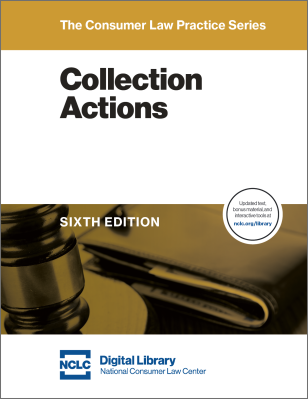Increasing Interest in Challenging Criminal Justice Debt Enforcement
Consumer and other attorneys are increasingly focusing on helping clients deal with draconian enforcement of criminal justice debt. In at least forty-five jurisdictions individuals may be incarcerated for “willful” nonpayment of criminal justice debts or non-payment of debt is treated as a condition of a suspended sentence or of probation. In many states, non-payment can also lead to suspension of driver’s or professional licenses, restrictions on expungement of criminal records, and denial of the right to vote. Debtors may also face garnishment of their wages or benefits, seizure of their tax refunds or other assets, aggressive or problematic interactions with debt collection agencies, and credit reporting consequences.
These oppressive collection methods are exacerbated by jurisdictions’ eagerness in the criminal justice system to load on charges as a source of government revenue. The quest for revenue results in charges for court-appointed criminal defense attorneys, costs for incarceration, surcharges on existing fines, and various other fees piled upon criminal defendants. Interest, late penalties, collection costs, and other charges may balloon the debt further into many thousands of dollars so that it is unaffordable for lower income clients, especially those already facing employment and housing barriers related to their criminal record. Individuals may come out of jail or prison with significantly higher debt than they had at sentencing and no realistic way to pay for it.
This checklist outlines options for dealing with criminal justice debt, including:
- Waiver or reduction of the debt or use of a payment plan;
- Constitutional arguments to prevent imprisonment based on inability to pay or to limit unduly harsh collection methods;
- Application of federal or state exemption laws;
- Filing a chapter 7 or chapter 13 bankruptcy;
- Affirmative litigation.
This checklist briefly outlines these options, and contains links where more detail is found primarily in NCLC’s Collection Actions, Chapter 11: Criminal Justice Debt. A new version of that chapter has just been uploaded digitally. All links are to that treatise unless indicated otherwise.
Because criminal justice debt is primarily imposed, collected, and regulated at the state and local levels, the options available to serve a client in any given case will depend on the jurisdiction. This checklist flags potential options though exact options will vary by jurisdiction.
Understanding Implications of Criminal Justice Debt for a Client
Criminal justice debt likely will involve issues that many consumer attorneys will find unfamiliar. The attorney’s approach to a particular client will depend on the answers to the following questions attorneys should address when representing a client with criminal justice debt:
- Is the criminal justice debt owed to the state, the municipality, the federal government, or a private entity?
- Is the debt criminal, civil, or juvenile?
- What part of the debt involves a fine, a restitution order, an indigent defense attorney fee, a bail bond, a statutory surcharge, a “user fee” (such as testing fees, prosecution fees, prison fees, supervision fees), interest, or collection costs?
- What are the state’s statutory provisions and practices regarding criminal justice debt. See https://cjdebtreform.org/state-analysis.
- Is the client already on a payment plan, and what is the payment status?
- Is the client on probation or parole and could non-payment result in revocation of probation or parole and a resulting incarceration?
- Is the client otherwise at risk of incarceration for non-payment or for non-attendance at hearings regarding the debt? See https://cjdebtreform.org/state-analysis.
- Are there other particularly concerning consequences for non-payment of the debt, such as suspension of driver’s licenses and limitations on expungement of their criminal record? See https://cjdebtreform.org/state-analysis.
- Are the client’s wages, benefits, or taxes being garnished or offset, or has there been notice of such action?
Criminal Justice Debt Raises Unique Questions As to Client Representation
- Who is the client’s criminal defense attorney(s), if any, and would the client benefit from representation or sharing of information by a criminal defense attorney and/or consumer attorney?
- Does the debtor have the right to counsel? Do not assume that individuals with court debt will be appointed counsel.
- Attorneys funded through the Legal Services Corporation may represent clients in many, though not all, types of criminal justice debt proceedings. See § 11.4.2.
Preventing Incarceration for Non-Payment of Criminal Justice Debt
- The client has a constitutional right to an ability-to-pay assessment prior to incarceration for nonpayment, and lack of ability to pay should provide a constitutional defense to incarceration. See § 11.4.4.1.
- Take steps to preserve for appeal a court’s failure to offer a meaningful hearing on the client’s ability to pay.
- Prepare for the ability-to-pay hearing by understanding local practice and state requirements. See https://cjdebtreform.org/state-analysis.
- Where ability-to-pay standards are poorly defined, consider pointing to other standards and evidence for inability to pay that have been adopted by government entities, including IRS Collection Financial Standards or Department of Education financial hardship standards for student loans. See § 11.4.4.2.
- Understand a client’s financial situation thoroughly, and be prepared to present evidence of income, reliance on means-tested benefit programs, unemployment and attempts to attain employment and barriers thereto, disabilities, childcare responsibilities, other debt obligations, family expenses, homelessness, recent incarceration, and past payment history showing a willingness to pay when resources are available. See § 11.4.4.2.
- The absence of appointed counsel in the criminal case may provide a defense to incarceration due to a revocation of a suspended sentence for non-payment of criminal justice debt. See § 11.4.5.
- Assess whether state constitutional standards provide additional protections beyond the federal constitutional standards. See § 11.4.7.
- Is the debt so old that it is no longer collectible, based on a statute of limitations, laches, or other factors? See § 11.4.8.
Alternative Dispositions Where Criminal Justice Debt Unpaid
- Wherever possible, seek cancellation or reduction of the debt or an affordable payment plan. See § 11.4.6.
- If community service is an alternative to payment of criminal justice debt, make sure that the client fully understands and prefers community service before pursuing that option. Potential problems with the community service option may include: transportation barriers; time obligations that conflict with work, child care, or treatment obligations; fees associated with the service option; and the feasibility of actually completing the total number of service hours required. See § 11.4.6a.
Federal Criminal Justice Debt: Limits on Ability to Seize Wages, Bank Accounts, or Property
- For federal criminal justice debt, the Federal Debt Collection Procedures Act provides clients a choice of protection based on federal Bankruptcy Code exemptions or all applicable state and non-bankruptcy federal exemptions. See § 11.5.3.1.2.
- Federal law protects from garnishment two months’ worth of electronically deposited amounts in a bank account for Social Security, SSI, VA, and certain other federal benefits, except for fines and restitution. See § 11.5.3.1.6.
- Special rules apply to fines and restitution orders issued by a federal court. See § 11.5.3.1.3.
- Because of the application of the Claims Collection Act to certain federal criminal justice debt, different rules may also apply particularly charges imposed by the federal prison or probation system. See § 11.5.3.1.4.
- All types of federal criminal justice debt are subject to federal limits on wage garnishment. See § 11.5.3.1.5.
State and Municipal Criminal Justice Debt: Limits on Ability to Seize Wages, Bank Accounts, or Property
- Federal wage garnishment protections should apply to state and municipal criminal justice debt. See § 11.5.4.2.
- Other federal exemptions, such as those relating to Social Security, SSI, and ERISA income apply to state and municipal criminal justice debt. See § 11.5.4.3.
- Federal student loans and grants should not be subject to seizure to pay state and municipal criminal justice debt. See § 11.5.4.4.
- State law provides for extensive exemptions. A state-by-state summary of those exemptions is found at NCLC’s Collection Actions Appendix G.
- Whether state exemptions apply to criminal justice debt varies by state and by type of debt. State exemptions may not apply to fines, but may apply to restitution orders, user fees, indigent defense fees, or incarceration costs. See § 11.5.5.1.
- Whether the client is on probation, parole, work release or other special status also may affect application of a state’s exemptions. See § 11.5.5.1.
Bankruptcy’s Ability to Deal with Criminal Justice Debt
- The bankruptcy automatic stay prevents most collection activity, even involving criminal justice debt. But the stay may not apply to probation revocation based on failure to pay criminal justice debt or on the federal government’s enforcement of the Mandatory Victims Restitution Act. See § 11.6.2.
- Whether a bankruptcy can cancel or reduce criminal justice debt may depend on whether a chapter 7 or a chapter 13 case is filed.
- Criminal and civil fines, including traffic and parking fines, are generally not dischargeable in a chapter 7 bankruptcy. See §§ 11.6.3.2, 11.6.3.3.
- Restitution orders are generally not dischargeable in a chapter 7 bankruptcy. See § 11.6.3.4.
- Juvenile restitution owed by parents is generally dischargeable in the parents’ chapter 7 bankruptcy. See § 11.6.3.5.
- Whether a criminal justice debt related to “costs” or “fees” is dischargeable in chapter 7 may depend on the description of the cost or fee and whether that cost or fee is separately charged and not lumped in with other criminal justice debt. See § 11.6.3.6.
- Unclear in most states is whether costs of prosecution or incarceration or deferred judgment or indigent defense fees or surcharges or amounts owed on bail bonds are dischargeable in chapter 7. See §§ 11.6.3.7, 11.6.3.8, 11.6.3.9, 11.6.3.10, 11.6.3.11.
- Collection costs, at least those owed to non-governmental entities, are dischargeable in chapter 7, and whether interest on debt is dischargeable generally depends on whether the underlying debt is dischargeable. See § 11.6.3.12.
- A chapter 13 bankruptcy may offer additional options to discharge criminal justice debt. But in proposing a chapter 13 plan, care must be taken in classifying criminal justice debt. See § 11.6.4.3.
- Certain criminal justice debt can be included in a chapter 13 plan, meaning that the debt need only be paid in part or not at all. When the chapter 13 plan is completed, that debt is discharged. See § 11.6.4.1.
- Punitive fines and restitution ordered as part of a criminal sentence are not dischargeable upon completion of a chapter 13 plan. See § 11.6.4.2.
- Municipal court fines and traffic fines where the underlying action is civil rather than criminal are generally dischargeable in chapter 13, as is juvenile delinquency restitution debt. See § 11.6.4.2.
Affirmative Litigation Challenging Criminal Justice Debt Practices
- Affirmative lawsuits seeking class or injunctive relief concerning some of the most unfair aspects of criminal justice debt enforcement have multiplied in recent years. See, e.g., § 11.7.1.5.
- Constitutional claims may involve due process, right to counsel, equal protection, bias based upon financial interests, or excessive fines. See § 11.7.1.
- Potential discrimination claims can include violation of the Civil Rights Act title VI or of the Equal Credit Opportunity Act. See §§ 11.7.2 and 11.7.3.
- Certain private collectors may be subject to the restrictions and remedies of the Fair Debt Collection Practices Act, though whether criminal justice debt is covered under the Act is complicated. State debt collection or deceptive practices statutes may provide alternative claims. See § 11.7.4.
- State or local agencies and private parties furnishing information to credit reporting agencies about criminal justice debt may be subject to the Fair Credit Reporting Act. See § 11.7.5.
- Abuse of process, other torts, or state statutory violations may provide additional claims. See § 11.7.5a.
- Any affirmative litigation must consider potential barriers to relief, including sovereign and qualified immunity, judicial immunity, and abstention. See § 11.7.6.



